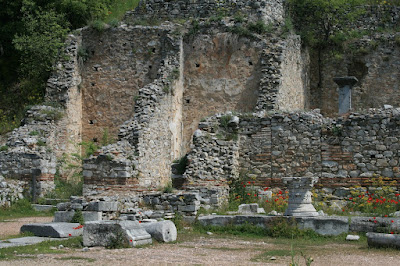According to the New Testament, Apostle Paul was guided to Philippi in AD 49 or 50 by a vision. Accompanied by Silas, Timothy and possibly also Luke (the author of the Acts of the Apostles), Paul preached for the first time on European soil in Philippi and baptized Lydia (thus she became the 1st Christian in Europe) in a river to the west of the city. While in Philippi, his exorcism of a demon from a slave girl caused a great uproar in the city, which led to Paul and Silas' public beating and arrest. An earthquake caused their prison to be opened. When the jailer woke up, thinking all the prisoners had escaped and knowing that he would be severely punished, was preparing to kill himself. But Paul stopped him, indicating that all the prisoners were in fact still there. The jailer
then became one of the first Christians in Europe (see Bible Acts 16:16-40).
The first excavations of Philippi did not begin until the summer of 1914, and were soon interrupted by the First World War. The excavations, carried out by the École française d'Athènes, were renewed in 1920 and continued until 1937. During this time the Greek theatre, the forum, Basilicas A and B, the baths and the walls were excavated. After the Second World War, Greek archaeologists returned to the site. From 1958 to 1978, the Société Archéologique, then the Service archéologique and the University of Thessaloniki uncovered the bishop's quarter and the octagonal church, large private residences, a new basilica near the Museum and two others in the necropolis to the east of the city.

To arrive at Philippi, the most easy way would be to take the airplane to Kavala (Megas Alexandros Int'l Airport is 27.4 km from Kavala city center) from Athens or during the summer season many smaller European airline companies have direct chartered flights to Kavala from a European city (such as London Gatwick, Frankfurt, Munich, Hamburg etc.), then take a taxi from the airport or rent a car at airport and drive to your hotel in Kavala. Northern Greece is much easier to drive than the capital city of Athens, I wouldn't drive in the city of Athens if I were a foreigner (take the Metro subway in Athens is the best and safest except in the Metro you must watch out for those pickpocketers).
In Kavala, I stayed once in the Egnatia hotel (in a hillside with magnificent view overlooking the city of Kavala), and twice in Hotel Lucy (with a supermarket Masouti and the Kalamitsa beach at its front and back), a taxi ride will take you to Philippi (14km away from Kavala city center), or by bus (KTEL in Kavala is at 4 Mitropolitou Chryssostomou St.). Alternatively, one can land in Thessaloniki by airplane then take a long distance bus to Kavala (the trip is about 2 hours by KTEL express from Thessaloniki currently leaves daily at 9:00, 13:00, 17:00), then from KTEL Kavala, there is bus to Drama which makes a stop at Philippi on the way to Drama.
My family always rents a car when we fly to another city, so I have no experience of riding on a KTEL bus, generally speaking travelers should verify bus schedules themselves (with the help of a hotel staff as Greek is usually the language needed to communicate with KTEL).
Bus schedules in Greece between summer peak season and the winter time are not the same, also the museum hours during winter are always much shorter. Check the ekathimerini's survival guide for some useful info.
When I first went to Kavala, we took the ferry to see the island of Thassos beside visiting our extended families, at the time when we drove by Philippi it was around 30 minutes before closing, so I didn’t buy the entrance ticket; the second time I went to Kavala, I managed to see only half of the Philippi site. I have never visited Philippi in the summer time when the ancient theater apparently has festival activities.
What I am most impressed with Kavala is that the fish
they eat there are ultra "fresh", the best mussels I have ever tasted
in Greece is in Kavala, and if you have relatives or friends who live there and
go fishing as a hobby / sport, then the sea near Kavala is simply blessed with
abundance of seafood. It is also a city that
I feel there was strong Muslim influence historically. Kavala’s photos will be in a separate post
when I come around to organize them.
Other events or attractions that can be combined with a visit to Philippi include: Kavala air show in June, Thassos Island, and wine tasting / production tour in Drama. I have toured the Kostas Lazaridi Estate (Κτήμα Κώστα Λαζαρίδη) in Drama and bought some wines there. I have also heard about the award-winning Biblia Chora (pronounced vivlia hora, in Greek Βιβλία Χώρα) wines which are based in Kavala. Greek wines are very good (thanks to our sunny weather during the summer, more than 70% of the Greek wines entered in the world’s biggest wine competition have won medals) but their productions are small and not yet internationally well-known, just like the Greek olive oil
If you'd like to see all the photos I took of the ancient Philippi, you will go to this link.


















No comments:
Post a Comment